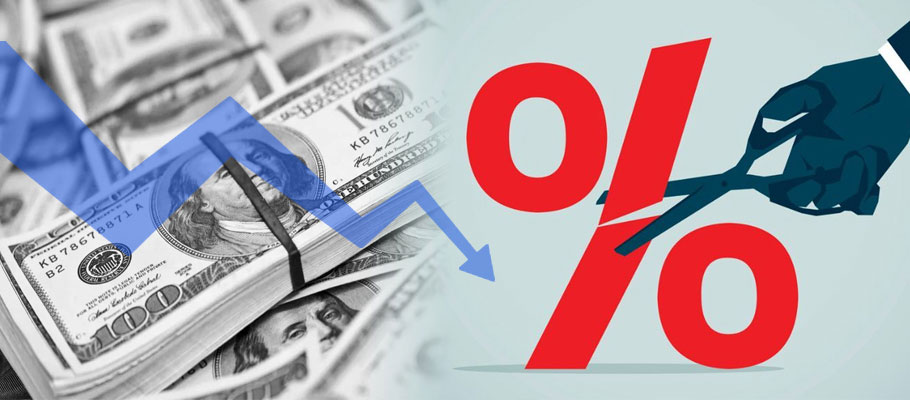
Published: August 21st, 2024
Predictions of a 25-basis point rate cut by the US Federal Reserve are growing as its September meeting gets closer. Analysts at Deutsche Bank say consensus is for cumulative cuts of 95 basis point by year-end, pressurizing the Dollar and depreciating it to a seven-month low against G10 peers.
On Tuesday 20th August, GBP/USD as trading a third of a per cent higher at 1.2983, while EUR/USD stayed above 1.10 with a further advance of 0.34 per cent to 1.1065. Meanwhile the Dollar index was down 0.40 per cent at 101.98.
In a note to investors, the German bank said forex traders are ratcheting-up expectations for a run of consecutive interest rate cuts, and looking to this Friday’s keynote address to the Jackson Hole Symposium by Fed Chair Jerome Powell for confirmation.
With US inflation settling down to the central bank’s 2 per cent target, an apparent slowdown in hiring, and unemployment inching up, Fed policymakers seem poised to cut the benchmark interest rate in September from its current 23-year high.
‘Jackson Hole is the key event risk in this calendar cycle,’ Deutsche analysts wrote. ‘Traders are currently pricing-in between 25 and 50 basis points of cuts next month, and a little less than 100 basis points across the remainder of 2024.
Deutsche warns, however, that cumulative cuts of 75 basis points this year is a more realistic estimate, delivered in increments of 25 following each meeting. That would undercut current consensus and slow the Dollar’s descent.
As investors look for confirmation of the Fed’s interest rate plans for Autumn and early Winter, The Jackson Hole Symposium has become the main focus of an otherwise data-light week.
In late July, an analysis of foreign exchange movements by ING Bank pegged recent USD advances to a growing belief amongst traders that Donald Trump is on track win the US Presidential election in November.
In a note to investors, the bank’s FX strategy unit wrote that ‘we have seen USD rally twice recently following events that would seem to improve the chance of a Donald Trump win in the race for the US presidency. The most recent was a favorable Supreme Court ruling’.
Earlier in July, the US Supreme Court ruled that former presidents can expect immunity from prosecution for official acts taken while they were in office (though they can’t expect immunity for unofficial acts).
‘It is now clear that traders perceive a link between Trump and a stronger dollar’.
The ruling means the Biden government’s election interference case against Trump will now head back to a lower court, which will need to decide how, or if, to continue the case. At the very least it seems unlikely to be heard before the election, clearing another hurdle for Trump's return to the White House.
ING analysts said the Trump effect on USD is based on assumptions of lower taxes, higher growth, protectionism measures likely to aggravate inflation, and geopolitical uncertainty.
‘With the momentum seemingly favoring former president Trump’s bid for a second term in the White House, combined with forecasts that the Republican Party will take control of both the Senate and the House of Representatives, traders are now looking for reduced immigration, increased tariffs, and lower taxes. The combined impact if these measures could lead to higher inflation, bigger deficits, and more activist policy by the US Fed.’
The Trump effect extends beyond fiat markets. Earlier in the election campaign, when the two major parties were conducting primaries to choose their respective Presidential candidates, then-contender Ron Desantis made a notable about-face on crypto policy.
He told supporters at a political rally that he would end the US government’s 'campaign of harassment’ against the crypto industry, signing a pro-Bitcoin decree on his first day in office if elected to the White House. The move was widely read as an appeal to Trump voters, who tend to be pro-crypto.
Speaking to a crowd during a campaign stop in New Hampshire, DeSantis, who is governor of Florida, said ‘Biden's battle to stop the rise of Bitcoin and cryptocurrency will cease immediately when I become president.’
DeSantis was fighting an uphill battle against Trump at the time as he sought the Republican Party nomination. In the past he had maintained an ambivalent attitude towards cryptocurrencies. The NEw Hampshire speech affirmed a positive view of crypto while criticizing the Biden administration’s push for a Central Bank Digital Currency (CBDC).
‘When I become President, plans for a US CBDC go straight into the bin. We will not allow it.’
Unlike cryptocurrencies, which are created and distributed privately, CBDCs would be issued by a country’s central bank and could be designed to limit or ban some transactions. As Florida Governor, DeSantis actually banned issuance of any federal CBDC within the state’s borders, saying it would be used as a mechanism for government surveillance and control.
After announcing his bid for the Republican presidential nomination, DeSantis joined Elon Musk in a Twitter Spaces broadcast to clarify his position on crypto. He said that citizens have 'the right’ to use Bitcoin. He said that he supports the technology personally, and that its existence is under threat if current US President Joe Biden is re-elected.
‘Bitcoin is a threat to the Democrats and their backers in traditional finance,’ DeSantis said at the time. ‘They want to regulate it out of existence.’
US crypto firms were starting to move operations overseas to avoid American restrictions on banking access and regulatory clampdowns. Industry leaders like Coinbase and Grayscale took to the courts to fight Washington for the freedom to launch new products. Both firms said they want also wanted more regulatory clarity.
Had it happened, a DeSantis presidency would have reversed current political thinking and put the US on course for greater crypto adoption.
Previously, the G20’s finance watchdog had warned that wider systemic risk was on the cards if crypto firms weren't reined in by new regulations.